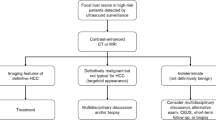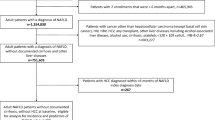Abstract
Background
Liver inflammation is a reaction to disease-causing stress in the liver that induces fibrosis and cirrhosis. However, its prognostic impact after hepatectomy remains unclear. This study aimed to evaluate the prognostic and oncologic impacts of liver inflammation on patients after curative hepatectomy for hepatocellular carcinoma (HCC).
Methods
The study enrolled 500 consecutive patients with primary HCC who underwent curative and primary hepatectomy. Patient characteristics and prognoses were evaluated according to histologic liver inflammation assessed by the New Inuyama Classification.
Results
Severe liver inflammation (A3) was observed in 97 patients (19.4%) and nonsevere liver inflammation (A0-2) in 403 patients (80.6%). The patients with A3 had a significantly poorer prognosis than those with A0-2 in terms of relapse-free survival (p < 0.0001, log-rank) and overall survival (p = 0.0013, log-rank). The study showed that A3 is an independent poor prognostic factor (hazard ratio, 1.36; 95% confidence interval [Cl], 1.02–1.81; p = 0.039), and that Child-Pugh grade B and multiple tumors are associated with relapse-free survival. Furthermore, The significant predictors of early recurrence (within 2 years after hepatectomy) were A3 (odds ratio, 2.10; 95% CI, 1.25–3.55; p = 0.005), a des-γ-carboxyprothrombin level higher than 40 mAU/mL, and multiple tumors.
Conclusions
Severe liver inflammation was associated with poor short- and long-term prognoses independently of cirrhosis. Controlling liver inflammation in the perioperative period may be essential to improving the prognosis of patients with HCC after hepatectomy.





Similar content being viewed by others
References
Bray F, Ferlay J, Soerjomataram I, et al. Global cancer statistics 2018: GLOBOCAN estimates of incidence and mortality worldwide for 36 cancers in 185 countries. CA Cancer J Clin. 2018;68:394–24.
Yang YM, Kim SY, Seki E. Inflammation and liver cancer: molecular mechanisms and therapeutic targets. Semin Liver Dis. 2019;39:26–42.
Hasegawa K, Kokudo N, Makuuchi M, et al. Comparison of resection and ablation for hepatocellular carcinoma: a cohort study based on a Japanese nationwide survey. J Hepatol. 2013;58:724–9.
Grivennikov SI, Greten FR, Karin M. Immunity, inflammation, and cancer. Cell. 2010;140:883–99.
Keenan BP, Fong L, Kelley RK. Immunotherapy in hepatocellular carcinoma: the complex interface between inflammation, fibrosis, and the immune response. J Immunother Cancer. 2019;7:267.
Loomba R, Lawitz E, Mantry PS, et al. The ASK1 inhibitor selonsertib in patients with nonalcoholic steatohepatitis: a randomized, phase 2 trial. Hepatology. 2018;67:549–59.
Friedman SL, Ratziu V, Harrison SA, et al. A randomized, placebo-controlled trial of cenicriviroc for treatment of nonalcoholic steatohepatitis with fibrosis. Hepatology. 2018;67:1754–67.
Ishak K, Baptista A, Bianchi L, et al. Histological grading and staging of chronic hepatitis. J Hepatol. 1995;22:696–9.
Bedossa P, Poynard T. An algorithm for the grading of activity in chronic hepatitis C. The METAVIR Cooperative Study Group. Hepatology. 1996;24:289–93.
Ichida F, TSuji T, Omata M, Ichida T, Inoue K, Kamimura T, Yamada G, Hino K, Yokosuka O, Suzuki H. New Inuyama Classification; new criteria for histological assessment of chronic hepatitis. Int Hepatol Commun. 1996;6:112–9.
Patel K, Sebastiani G. Limitations of noninvasive tests for assessment of liver fibrosis. JHEP Rep Innovat Hepatol. 2020;2:100067.
Amin MB, Greene FL, Edge SB, et al. The eighth-edition AJCC cancer staging manual: continuing to build a bridge from a population-based to a more “personalized” approach to cancer staging. CA Cancer J Clin. 2017;67:93–9.
Imai K, Beppu T, Chikamoto A, et al. Comparison between hepatic resection and radiofrequency ablation as first-line treatment for solitary small-sized hepatocellular carcinoma of 3 cm or less. Hepatol Res. 2013;43:853–64.
Beppu T, Ishiko T, Chikamoto A, et al. Liver-hanging maneuver decreases blood loss and operative time in a right-side hepatectomy. Hepatogastroenterology. 2012;59:542–5.
Dindo D, Demartines N, Clavien PA. Classification of surgical complications: a new proposal with evaluation in a cohort of 6336 patients and results of a survey. Ann Surg. 2004;240:205–13.
EASL clinical practice guidelines. management of hepatocellular carcinoma. J Hepatol. 2018;69:182–236.
Galle PR, Foerster F, Kudo M, et al. Biology and significance of alpha-fetoprotein in hepatocellular carcinoma. Liver Int. 2019;39:2214–29.
Hoshida Y, Nijman SM, Kobayashi M, et al. Integrative transcriptome analysis reveals common molecular subclasses of human hepatocellular carcinoma. Cancer Res. 2009;69:7385–92.
Furuta M, Ueno M, Fujimoto A, et al. Whole genome-sequencing discriminates hepatocellular carcinoma with intrahepatic metastasis from multi-centric tumors. J Hepatol. 2017;66:363–73.
Llovet JM, Zucman-Rossi J, Pikarsky E, et al. Hepatocellular carcinoma. Nat Rev Dis Primers. 2016;2:160.
Roayaie S, Bassi D, Tarchi P, et al. Second hepatic resection for recurrent hepatocellular cancer: a Western experience. J Hepatol. 2011;55:346–50.
Yoh T, Seo S, Taura K, et al. Surgery for recurrent hepatocellular carcinoma: achieving long-term survival. Ann Surg. 2019;273:792–9.
Tu T, Budzinska MA, Maczurek AE, et al. Novel aspects of the liver microenvironment in hepatocellular carcinoma pathogenesis and development. Int J Mol Sci. 2014;15:9422–58.
Yan L, Xu F, Dai CL. Relationship between epithelial-to-mesenchymal transition and the inflammatory microenvironment of hepatocellular carcinoma. J Exp Clin Cancer Res. 2018;37:203.
Jiang Y, Chen P, Hu K, et al. Inflammatory microenvironment of fibrotic liver promotes hepatocellular carcinoma growth, metastasis, and sorafenib resistance through STAT3 activation. J Cell Mol Med. 2021;25:1568–82.
Lurje I, Czigany Z, Bednarsch J, et al. Treatment strategies for hepatocellular carcinoma: a multidisciplinary approach. Int J Mol Sci. 2019;20:1465.
Bruix J, Takayama T, Mazzaferro V, et al. Adjuvant sorafenib for hepatocellular carcinoma after resection or ablation (STORM): a phase 3, randomised, double-blind, placebo-controlled trial. Lancet Oncol. 2015;16:1344–54.
El-Khoueiry AB, Sangro B, Yau T, et al. Nivolumab in patients with advanced hepatocellular carcinoma (CheckMate 040): an open-label, non-comparative, phase 1/2 dose escalation and expansion trial. Lancet London Engl. 2017;389:2492–502.
Finn RS, Qin S, Ikeda M, et al. Atezolizumab plus bevacizumab in unresectable hepatocellular carcinoma. N Engl J Med. 2020;382:1894–905.
Tanaka S, Shinkawa H, Tamori A, et al. Surgical outcomes for hepatocellular carcinoma detected after hepatitis C virus eradiation by direct-acting antivirals. J Surg Oncol. 2020;122:1543–52.
Morgan RL, Baack B, Smith BD, et al. Eradication of hepatitis C virus infection and the development of hepatocellular carcinoma: a meta-analysis of observational studies. Ann Intern Med. 2013;158(5 Pt 1):329–37.
George SL, Bacon BR, Brunt EM, et al. Clinical, virologic, histologic, and biochemical outcomes after successful HCV therapy: a 5-year follow-up of 150 patients. Hepatology. 2009;49:729–38.
Shimada S, Mogushi K, Akiyama Y, et al. Comprehensive molecular and immunological characterization of hepatocellular carcinoma. EBioMedicine. 2019;40:457–70.
Acknowledgments
We thank the American Journal Experts team (https://www.aje.com) for editing a draft this report.
Funding
This study was supported by the Japan Society for the Promotion of Science (JSPS); 201960331 and 20K16418 (TM).
There are no conflicts of interest.
Author information
Authors and Affiliations
Corresponding author
Additional information
Publisher's Note
Springer Nature remains neutral with regard to jurisdictional claims in published maps and institutional affiliations.
Supplementary Information
Below is the link to the electronic supplementary material.
Supplementary Figure 1
In the patients with A3 (n = 96), we also evaluated the prognostic impact of etiology (HBV or HCV or NBNC), and there was no significant difference in RFS and OS. *One patient was infected with both HBV and HCV, and was excluded from this study due to low statisticalnumbers (TIFF 9202 kb)
Rights and permissions
About this article
Cite this article
Miyata, T., Hayashi, H., Yamashita, Yi. et al. The Impact of Histologic Liver Inflammation on Oncology and the Prognosis of Patients Undergoing Hepatectomy for Hepatocellular Carcinoma. Ann Surg Oncol 29, 893–902 (2022). https://doi.org/10.1245/s10434-021-10706-7
Received:
Accepted:
Published:
Issue Date:
DOI: https://doi.org/10.1245/s10434-021-10706-7




